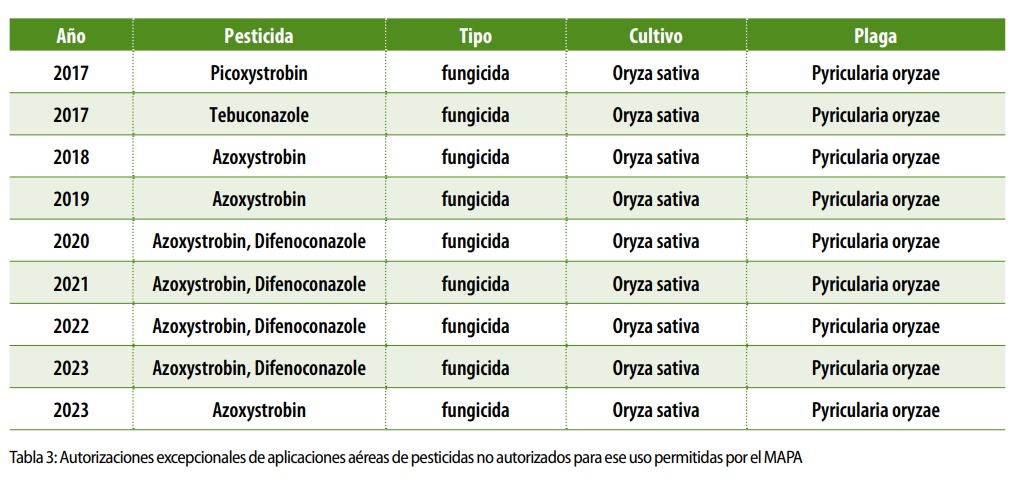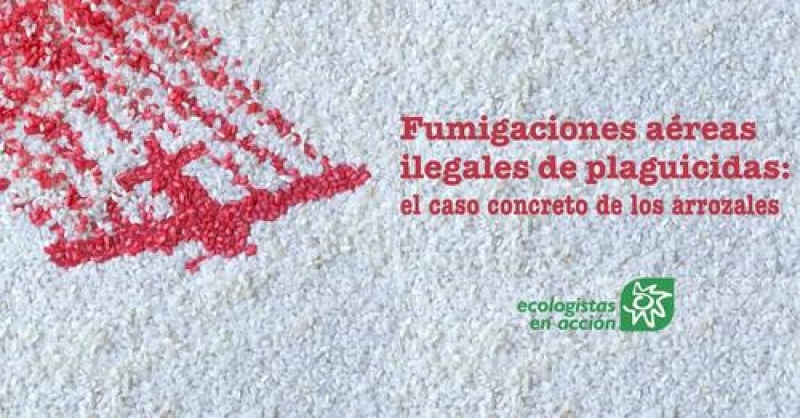Spraying pesticides on crops from small planes or helicopters is explicitly prohibited by law. Following a complaint from Ecologistas en Acción, the Ombudsman reiterates that aerial spraying of rice fields -past or future- with pesticides not authorised for this application method is illegal. The organisation is calling on the Spanish Ministry of Agriculture to stop granting these permits and instead support the cultivation of non-toxic rice and oppose the import of rice containing banned pesticides.
Spraying pesticides from aerial vehicles such as light aircraft or helicopters on agricultural crops is explicitly prohibited by European and Spanish law. Despite this ban, 234,000 hectares of rice fields in Spain have been sprayed with pesticides, sometimes unauthorised, over the past five years.
The new report presented by Ecologistas en Acción “Illegal aerial spraying of pesticides: the specific case of rice fields” analyses the legislation that has been breached by aerial spraying of pesticides in recent years. The focus is on spraying carried out on Spanish rice fields.
Very toxic pesticides
The pesticides used for aireal spraying are all fungicides. In 2017 the extremely toxic Tebuconazole was sprayed, one of our Toxic 12 list. It is toxic to reproduction and connected to liver tumors. It is also very toxic to aquatic life and birds with a long lasting effect. For several year the very toxic defenoconazole was used. It mimics human hormones and has an endocrine-disrupting mode of action. This fungicide is very similar to medicines. It induces the very dangerous azole resistance in the funghi. This can lead to severe problems in the treatment of Aspergillosis, a fungal infection in humans.

Spanish Ombudsman reprimands authorities
The report includes the opinion of the Spanish Ombudsman. He concludes in his report that aerial spraying using pesticides not authorised for this application method is illegal. The regulations prohibit aerial spraying as a general rule. Exceptions are only allowed if aerial methods have clear advantages for human health and the environment or if there is no other viable alternative. In these cases, the autonomous communities can grant exceptional authorisation for aerial spraying of a pesticide previously permitted for this type of application. If a pesticide is used that has not been authorised for aerial spraying, a second exceptional authorisation is required from the Ministry of Agriculture, Fisheries and Food.
Over the past seven years, 34 exceptional authorisations have been granted for pesticides used in rice cultivation. Nine of them were for aerial spraying of pesticides. These authorisations were routine. Their reason was almost always economic and did not comply with the requirements of the law. In addition, pesticides were sprayed on protected natural areas without any prior study of their environmental impact.
In 2021, Ecologistas en Acción asked the Ombudsman to study the legality of aerial spraying over rice fields. In March 2024, the Ombudsman requested the cessation of these authorizations, which he concluded was illegal. He also declared illegal any that may occur in the future. Finally, the Ombudsman noted that authorisations for the aerial method are given successively. The authorities do not take into account the exceptional nature that these exceptions must have. And they are issued without transparency on the part of the autonomous communities. This Ombudsman opinion is not binding, but a recommendation that the Ministry of Agriculture should follow.
Growing rice without pesticides
Aireal spraying not necessary. It is possible to grow rice without applying pesticides, as is demonstrated by the 1,300 hectares organic rice production in Spain.
Kistiñe García, spokesperson for Ecologistas en Acción, said: “The Ministry of Agriculture must help expand the cultivation of rice without pesticides and oppose the unfair competition that comes with the import of rice with pesticides banned in the Spanish State.”
Read more: The nine aerial sprayings of pesticides carried out on rice fields in the last seven years are illegal, according to the Ombudsman (in Spanish)
